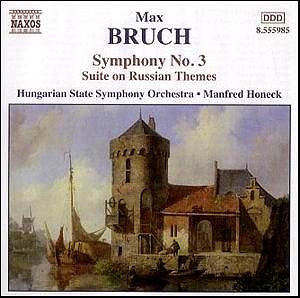
Symphony No.3 in E Op.51 (1883) [38.01]
Suite on Russian Themes Op.79b (1903) [21.08]
rec in the Hungaroton Studio, Budapest 28-31 May 1987
BUY NOW
 |
Max BRUCH (1838-1920)
Symphony No.3 in E Op.51 (1883) [38.01] Suite on Russian Themes Op.79b (1903) [21.08] rec in the Hungaroton Studio, Budapest 28-31 May 1987 |
|
|
|
||
With a performance of the third symphony to conduct within days of hearing this disc, it has been much in the forefront of my mind, and despite reviews already posted on the website by two colleagues, I feel moved to add an opinion, particularly about the symphony. I must also declare myself as Bruch’s biographer and probably among both his fiercest champions and his harshest critics. He tackled all recognised forms, excelling in the concerted works for violin, with the first head and shoulders above anything else he penned. His choral music needs more attention than it gets on the performing circuit (there’s a reasonable amount on record, though rather paradoxically of the larger, therefore more expensive, works to mount when it comes to planning a season), and I applaud Gerard Schwarz’s enthusiasm with his Royal Liverpool Philharmonic Orchestra. Bruch is also a top-class melodist with the folkmusic from colder lands (Scotland to Iceland via Sweden and Russia) a favoured source. On this disc the Suite is given a robust performance despite the arid acoustics of the recording studio, which has hopefully given way since 1987 (the year of this take) to something more resonant. Honeck lingers sympathetically where Bruch shines the focus on his favourite instruments, the combination of harp and cor anglais at the start a typical example. The adagio sostenuto has its vital funereal quality despite some internal rough blending and suspect-to-dire intonation within the brass and winds. Its sweet-toned violin solo is stylishly shaped followed by a paced outburst to the climax, where the strings bask in the joys of another of his melodies. The energetic ‘Song of the Volga Boatmen’ suffers most from the dry Hungaroton’s studio, the cymbal clashes in danger of making it all sound like a parody and too daft for words. | Error processing SSI file |
|
Return to Index |